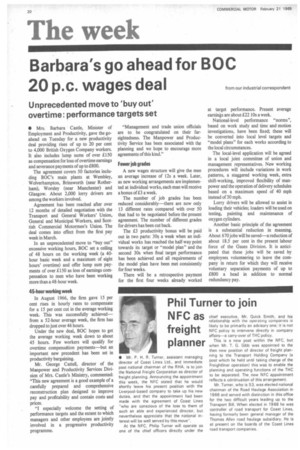Barbara's go ahead for BOC
Page 22

If you've noticed an error in this article please click here to report it so we can fix it.
20 p.c. wages deal from our industrial correspondent
Unprecedented move to 'buy out` overtime: performance targets set
• Mrs. Barbara Castle, Minister of Employment and Productivity, gave the goahead on Tuesday for a new productivity deal providing rises of up to 20 per cent to 4,000 British Oxygen Company workers. It also includes lump sums of over £150 as compensation for loss of overtime earnings and severance payments of up to £800.
The agreement covers 50 factories including BOC's main plants at Wembley, Wolverhampton, Brinsworth (near Rotherham), Worsley (near Manchester) and Glasgow. About 2,000 lorry drivers are among the workers involved.
Agreement has been reached after over 12 months of detailed negotiation with the Transport and General Workers' Union, General and Municipal Workers, and Scottish Commercial Motormen's Union. The deal comes into effect from the first pay week in March.
In an unprecedented move to 'buy out" excessive working hours, BOC set a ceiling of 48 hours on the working week (a 40hour basic week and a maximum of eight hours' overtime) and offer lump sum payments of over £150 as loss of earnings compensation to men who have been working more than a 48-hour week.
45-hour working week
In August 1966, the firm gave 15 per cent rises in hourly rates to compensate for a 15 per cent cut in the average working week. This was successfully achieved— from a 52-hour average week, the firm has dropped to just over 46 hours.
Under the new deal, BOC hopes to get the average working week down to about 45 hours. Few workers will qualify for overtime compensgtion payments—but an important new precedent has been set in productivity bargaining.
Mr. George Cattell, director of the Manpower and Productivity Services Division of Mrs. Castle's Ministry, commented: "This new agreement is a good example of a carefully prepared and comprehensive reconstruction plan designed to improve pay and profitability and contain costs and prices.
"I especially welcome the setting of performance targets and the extent to which managers and other employees are jointly involved in a progressive productivity programme.
-Management and trade union officials are to be congratulated on their farsightedness. The Manpower and Productivity Service has been associated with the planning and we hope to encourage more agreements of this kind."
Fewer job grades
A new wages structure will give the men an average increase of 12s a week. Later, as new working arrangements are implemented at individual works, each man will receive a bonus of £3 a week.
The number of job grades has been reduced considerably—there are now only 13 different rates compared with over 50 that had to be negotiated before the present agreement. The number of different grades for drivers has been cut back.
The £3 productivity bonus will be paid out in two parts: 30s a week when an individual works has reached the half-way point towards its target or "model planand the second 30s when final target performance has been achieved and all requirements of the model plan have been met consistently for four weeks.
There will be a retrospective payment for the first four weeks already worked
at target performance. Present average earnings are about £22 10s a week.
National-level performance "norms", based on work study and time and motion investigations, have been fixed; these will be converted into local level targets and "model plans" for each works according to the local circumstances.
The local-level application will be agreed in a local joint committee of union and management representatives. New working procedures will include variations in work patterns, a staggered working week, extra shift-working, improved flexibility of manpower and the operation of delivery schedules based on a maximum speed of 40 mph instead of 30 mph.
Lorry drivers will be allowed to assist in loading their vehicles; loaders will be used on testing, painting and maintenance of oxygen cylinders.
Another basic principle of the agreement is a substantial reduction in manning. About 670 jobs will be saved—a reduction of about 18.5 per cent in the present labour force of the Gases Division. It is anticipated that these jobs will be saved by employees volunteering to leave the company in return for which they will receive voluntary separation payments of up to £800 a head in addition to normal redundancy pay.












































































































